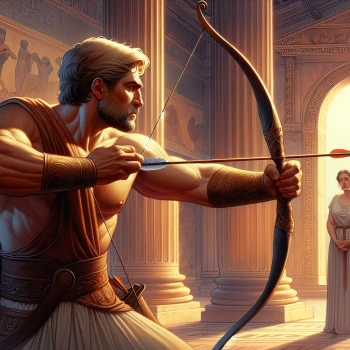
Homer
Homer, revered as the author of "The Iliad" and "The Odyssey," profoundly influenced Western literature through epic explorations of heroism, fate, and humanity.
Notable Works
Homer, the legendary ancient Greek poet, remains celebrated for two epic masterpieces: "The Iliad" and "The Odyssey." These foundational works of epic poetry continue to captivate readers with their vivid storytelling and profound exploration of timeless themes. "The Iliad" chronicles the intense drama and heroism of the Trojan War, reflecting deeply on themes of honor, fate, and the human cost of warfare. In contrast, "The Odyssey" follows the arduous journey of the hero Odysseus as he strives to return home after the war, offering rich insights into perseverance, loyalty, and the complexities of human nature. Notable characters such as Achilles, the fierce warrior whose pride and rage define much of "The Iliad," and Odysseus, whose cleverness and resilience shape the narrative of "The Odyssey," have become enduring symbols of Greek literature. Through these influential epics, Homer has profoundly shaped literary tradition, inspiring generations of writers and readers alike.
Books by Homer
Overview & Analysis
Homer, the enigmatic poet traditionally credited with composing the foundational epics of Western literature, "The Iliad" and "The Odyssey," profoundly shaped humanity's understanding of heroism, fate, and moral integrity. Writing during Greece's Archaic Period, Homer's vivid narratives explore the complexities of human conflict, divine intervention, and individual agency, encapsulating timeless struggles of honor, courage, and mortality. Central to his literary voice is an intense psychological and emotional insight into his characters, grappling with profound ethical dilemmas and internal moral evolution. His works emphasize loyalty, personal integrity, and the dignity of human endeavor, presenting an enduring critique of warfare, societal expectations, and the transient nature of life. Through masterful storytelling and rich symbolism, Homer established a lasting literary legacy, influencing countless generations of writers, philosophers, and artists. His profound explorations of the human condition continue to resonate, affirming his status as a cornerstone of cultural and literary tradition.
Back to TopInfluences & Worldview
Homer, often regarded as the cornerstone of Western literary tradition, articulated a profound exploration of human nature, heroism, and fate through his epic poetry. Writing during Greece's Archaic Period, his works, "The Iliad" and "The Odyssey," examine the complex interplay between personal honor, divine intervention, and mortal agency. Central to Homer's worldview is the dignity of human struggle, courage in the face of overwhelming odds, and an acute awareness of life's transient nature. His narratives delve deeply into the psychological and emotional dimensions of his characters, emphasizing moral reflection, individual responsibility, and the enduring importance of loyalty and personal integrity. Through vivid symbolism and compelling storytelling, Homer critically engages with societal norms, warfare, and ethical dilemmas, shaping enduring perspectives on heroism, justice, and the human condition that remain influential to this day.
Notable Characters
Homer is renowned for crafting deeply complex and heroic characters, exemplified by figures such as Achilles and Odysseus. Achilles, the protagonist of "The Iliad," embodies unmatched bravery, fierce pride, and tragic vulnerability, representing the idealized yet flawed hero whose intense emotions and internal struggles profoundly shape the narrative. In contrast, Odysseus, the central figure of "The Odyssey," personifies cunning intelligence, resilience, and resourcefulness, navigating numerous trials with wit and adaptability as he seeks his long-awaited return home. Homer's characters often exemplify both noble virtues and human weaknesses, mirroring the intricate moral landscape and cultural ideals of ancient Greek society. His nuanced portrayal of heroism, honor, and mortality reflects the worldview and existential concerns prevalent during his era. Through these timeless characters, Homer explores universal themes of fate, honor, and the human condition, revealing insights into the values and struggles that defined the ancient Greek civilization.
Back to TopThemes of Focus
Homer consistently explores the profound themes of heroism, honor, and the human condition in his epic poetry. Through the narratives of "The Iliad" and "The Odyssey," he examines the complexities of heroism, highlighting both the glory and the tragedy inherent in the pursuit of greatness. The ideal of honor permeates his works, often driving characters toward acts of bravery or tragic downfall. Additionally, he delves into the broader human experience, capturing the struggles, desires, and vulnerabilities that define humanity.
Secondary themes such as fate versus free will and the intervention of divine forces further enrich these primary motifs. The recurring presence of gods and their interference underscores the tension between human agency and predestined outcomes, prompting reflection on the extent of mortal control over one's destiny. These themes reflect the worldview of ancient Greece, marked by an acceptance of divine influence and a cultural emphasis on honor and heroism, demonstrating how deeply Homer’s poetry is rooted in the philosophical and cultural fabric of his time.
Back to TopLegacy & Impact
Homer's profound impact on literature, philosophy, and society has solidified his position as a foundational figure in Western culture. His epic poems, "The Iliad" and "The Odyssey," established narrative frameworks and archetypal characters that have influenced countless literary works and storytelling traditions. Themes of heroism, fate, honor, and human morality explored in his writing continue to resonate, providing a rich tapestry for philosophical and ethical contemplation.
Homer's works remain central in educational curricula worldwide, serving as critical texts for studying classical literature, mythology, and humanistic values. Characters such as Achilles, Odysseus, and Hector have persisted through time, symbolizing complex human qualities and moral dilemmas, and have inspired adaptations across various media, including literature, film, theater, and visual arts.
Contemporary scholarship continually revisits Homeric texts, analyzing their relevance to modern issues surrounding warfare ethics, personal responsibility, and societal norms. While some debates persist regarding the historical accuracy of Homer's authorship and the ideological implications of his portrayal of war and heroism, these discussions further underscore the enduring significance and complexity of his literary legacy. Homer thus remains a pivotal figure whose works continue to deeply influence cultural discourse and human understanding.
Back to TopConclusion
Homer's profound explorations of heroism, human nature, and destiny continue to resonate deeply within contemporary culture, underscoring the timeless relevance of his epic poetry. His vivid portrayal of personal honor, loyalty, and moral introspection laid foundational principles for Western literary traditions, influencing countless narratives on the complexities of human experience. By navigating the delicate interplay of divine intervention and mortal agency, Homer's writings have profoundly shaped our understanding of life's transient nature and the dignity inherent in human struggle.
Modern readers will find enduring wisdom and emotional truth in Homer's vivid storytelling. His characters, richly layered with psychological depth and moral complexity, still speak powerfully to today's audiences, inviting reflection on universal themes of courage, integrity, and personal responsibility. Exploring Homer's epics remains essential, offering invaluable insights into the enduring questions of human existence and the timeless pursuit of meaning.
Back to Top
